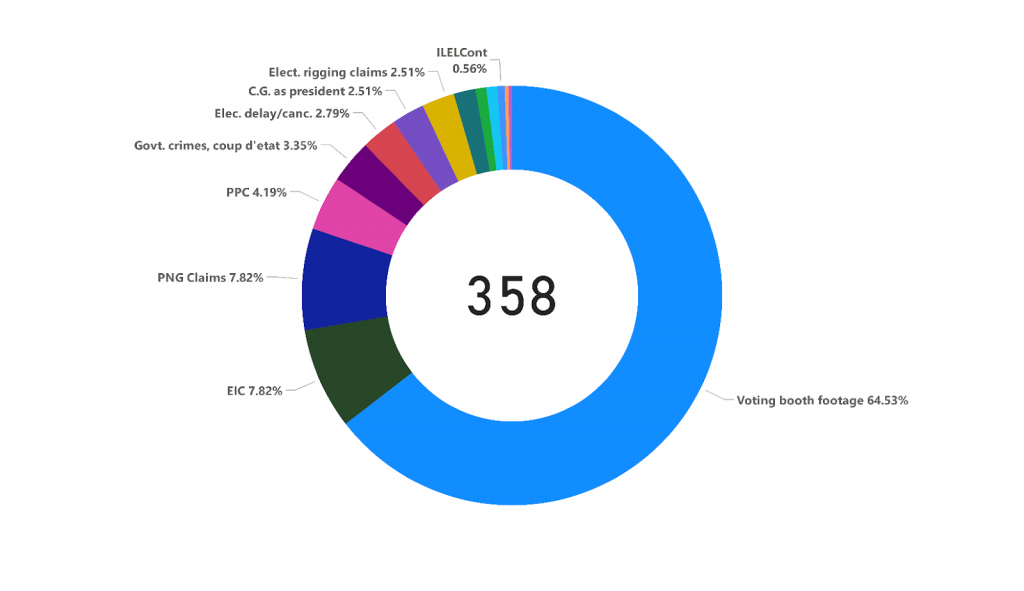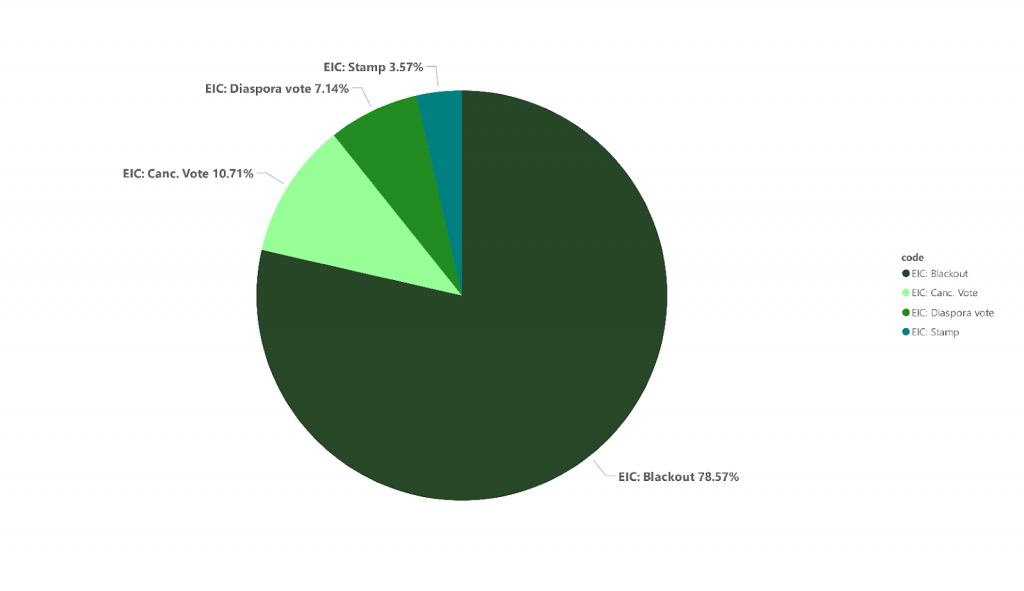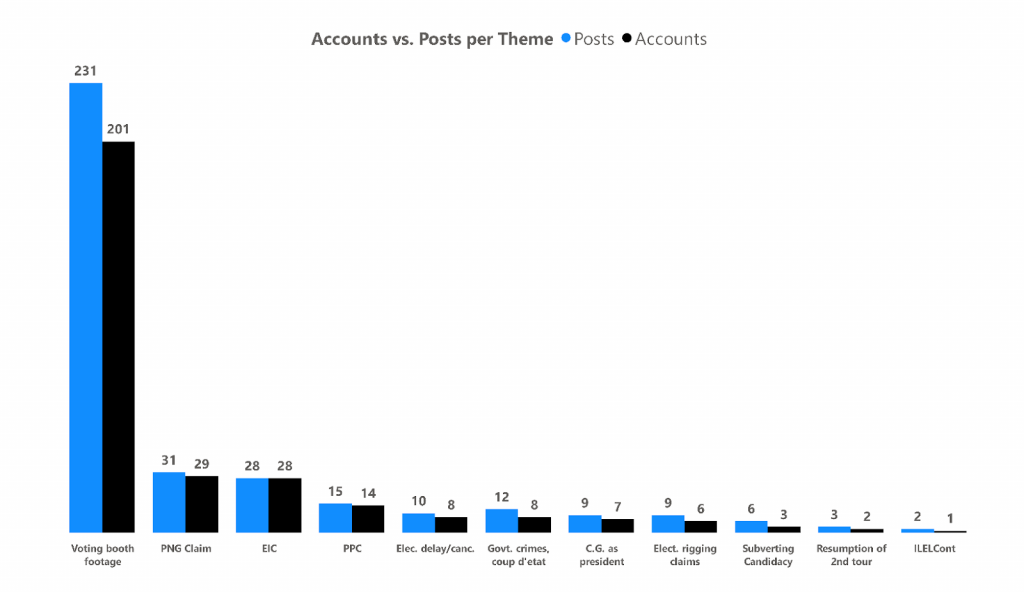Romania’s elections overview – 4 May 2025
This Bulletin is produced and published by Funky Citizens, Member of the Bulgarian-Romanian Observatory of Digital Media (BROD) and the EDMO Fact-Checking Network.
EXECUTIVE SUMMARY
As polls are closing and citizens await the first exit poll results at 9 PM, social media analysis revealed widespread disinformation campaigns attempting to shape public perception of the electoral process. We advise caution when it comes to the results of these exit polls as many refusals to answer them may affect the initial estimate.
Romanians casted their ballots today in the rescheduled presidential elections, a critical vote determining who will be the next president for the next five years. This election represents the culmination of months of political uncertainty following the controversial annulment of the November 2024 vote. As citizens participated in the electoral process across the country, the day was marked by several notable incidents. A pro-Russian hacking group launched coordinated DDoS attacks against government and candidate websites, though all were restored to operation by afternoon. Media controversies emerged when Romania TV received a three-hour broadcast suspension for airing false information about US sanctions against Romanian officials. AUR president George Simion voted alongside banned candidate Călin Georgescu, while electoral violations were reported in Optași-Măgura where a deputy mayor was filmed entering voting booths with voters. MEP Diana Șoșoacă publicly defaced her ballot in protest of what she termed “illegal and unconstitutional” elections.
Analysis of social media revealed coordinated disinformation campaigns featuring illegal voting booth footage, false claims about US persona non grata designations, premature polling claims, election rigging accusations, and various conspiracy theories about blackouts in the whole country.
WEEKLY OVERVIEW
The first exit poll results for the first round of the 2025 presidential elections will be announced immediately after polls close at 9 PM local time. These preliminary results will provide the first indication of which candidates are likely to advance to the second round scheduled for May 18, unless a candidate secures more than 50% of the vote in the first round.
A pro-Russian hacking group called NoName057, known for DDoS attacks against Ukraine-supporting countries, launched a coordinated attack against multiple Romanian government and candidate websites on election morning. The targeted domains included official government sites (Senate, Ministry of Interior, Ministry of Justice, Ministry of Foreign Affairs), the Constitutional Court, and websites of presidential candidates including Crin Antonescu, Nicușor Dan, and others. While the Ministry of Interior initially denied being attacked and claimed they were performing maintenance due to high traffic, the National Directorate for Cyber Security (DNSC) later confirmed that all targeted Romanian websites were operational.
The National Audiovisual Council (CNA) has imposed a penalty on Romania TV, suspending the network’s broadcast for three hours following a serious disinformation incident. The television station aired a “blacklist” of Romanian officials allegedly under US sanctions during the final 30 minutes of the electoral campaign on Friday evening, while presidential candidate Victor Ponta was in the studio. The supposed blacklist included interim President Ilie Bolojan, prime-minister Marcel Ciolacu, and Constitutional Court judges. CNA Vice President Valentin Jucan, who proposed the sanction, called the effects “extremely serious” as the false information continues to circulate among a significant portion of society with no correction from the station. Romania TV must suspend normal broadcasting on Wednesday, May 7, between 6 PM and 9 PM.
AUR president George Simion made an appearance at a polling station in Mogoșoaia on Sunday morning, accompanied by Călin Georgescu. After voting, both made declarations inside the polling station, with Georgescu claiming he was there not to “recognize a fraud like these elections” but to “recognize the power of democracy and the vote” Simion explicitly stated “I voted for Călin Georgescu” and declared their mission was to return to “constitutional order” and “democracy,” asserting they were working “with the people and for the Romanian people” with the sole desire to “do justice for Romania.”
A serious electoral violation was reported in Optași-Măgura, Olt County, where the deputy mayor was filmed entering voting booths with multiple voters. USR party representatives requested the removal of the polling station president for allowing this intimidation tactic, but their request was narrowly rejected in a 5-6 vote, with the representative from the Permanent Electoral Authority (AEP) casting the decisive vote against removal.
SOS Romania leader and MEP Diana Șoșoacă created controversy when she showed up to vote but publicly defaced her ballot in protest of what she called “illegal and unconstitutional” elections. After criticizing all candidates on the ballot with inflammatory accusations, Șoșoacă wrote the names of historical figures including Corneliu Zelea Codreanu, Nicolae Ceaușescu, and Corneliu Vadim Tudor on her ballot, before stamping her own name. Police warned her she was violating electoral law as she proclaimed, “This is how a vote in illegal and unconstitutional elections looks!” It’s worth noting that Șoșoacă’s candidacy was previously rejected by the Constitutional Court for both the November 2024 elections and this May elections.
SOCIAL MEDIA DISINFORMATION
The methodology used to collect and analyze the posts reported was by using manual queries and relying on platform recommender systems in order to collect the data disseminated on the 4th of May 2025, between 00 and 19:00 , which was then subsequently analyzed using Thematic Analysis (Brown and Clarke 2006) in two rounds of qualitative coding.

Compared to the other periods, the social media posts reported today were focused on voting and first hand election phenomena. The most prevalent were anti-system messages relayed through voting booth footage, disinformation that some politicians and officials are on a US “Persona Non Grata”, different claims of election interference, unofficial premature polling claims, narratives subverting some of the presidential candidates, as well as the dissemination of illegal electoral content. Themes were also carried over from previous reporting periods, namely that the Romanian Government is committing crimes against its own people, narratives supporting Călin Georgescu or portraying him as acting president, narratives claiming that the elections will be cancelled, discourses portraying the EU and France as subjugating Romania, the Resumption of the 2nd annulled tour portrayed as legal, mandatory and imminent, as well as an obscure Jewish plot against Romania.
Voting booth footage: This code refers to posts that illegally show voters’ choices inside the voting booth. These are serious violations of the electoral law, aiming to influence public perception or pressure voters by prematurely disclosing voting trends. These phenomena were accompanied by anti-system messages, as well as voter suppression narratives.
PNG Claims: These posts falsely assert that certain individuals have been banned from entering the United States, spreading misinformation to discredit political figures and influence public opinion by implying that foreign sanctions were put in place as legal consequences for criminal misconduct and/or abuse of power.
PPC (Premature Polling Claims): Posts under this code promote candidates by showcasing exit-poll claims or exaggerated international support like “everyone from Rome stands with” a candidate.
ILELCont (Illegal Electoral Content): Posts explicitly encouraging votes for a candidate through bold imagery and slogans.
Subverting Candidacy: This code refers to posts that challenge the legitimacy of electoral candidates by questioning petition signatures or spreading false endorsements (e.g., claiming one candidate votes or endorses another).
Elect. rigging claims: Posts here spread unverified and false claims about vote manipulation, ballot tampering, phantom voters, or external voter fraud especially involving the Moldovan diaspora.
C.G. as president: These posts promote Călin Georgescu as a presidential candidate using deceptive and emotionally charged content. Tactics include fabricated endorsements from Elon Musk or Donald Trump, slogans demanding mass turnout, and vilification of opposing figures to rally support for Georgescu. Some present Georgescu as already being the invested president, some as a viable candidate for the current electoral process.

EIC (Election Interference Claims): These narratives encompass a range of posts that spread misleading and false claims aimed at undermining trust in the electoral process. These include narratives about planned blackouts designed to sabotage voting, warnings to diaspora voters that sharing videos will cancel their ballots, misinformation about polling stations being closed abroad, false guidance on how to use the voting stamp, and doctored images to exaggerate turnout.
Govt. crimes, coup d’etat: This category includes an array of conspiracy theories alleging government corruption, foreign interference, illegal election annulments, and coup attempts. It alleges the existence of a conspiracy of the Romanian state to undermine democracy in Romania as well as foreign criminal inquiries meant to punish Romanian officials involved in the annulment of the previous elections.
Elec. delay/canc.: Posts clustered under this code predict or promote the cancellation of elections through emergency declarations, low turnout, or foreign intervention.
Resumption of 2nd tour: This category includes posts asserting that a second electoral round will be reinstated due to legal challenges. These messages use analogies or patriotic appeals to pressure for a repeat vote, portraying it as legal and mandatory.
Jewish plot against RO: This category includes antisemitic conspiracy theories falsely attributing genocidal plans to figures like George or Alex Soros, suggesting mass population replacement to incite fear and hatred.
EU and France subjugate RO: Posts here advance conspiracies that “globalist oligarchs,” often tied to the EU or France, are manipulating Romania into war or ruin. These narratives frame Romania as a victim of foreign domination, appealing to nationalist and xenophobic sentiments, as well as fear.

Regarding potential coordinated behaviour, several users disseminating “Voting booth footage” type of posts were reported to have disseminated multiple unique posts with the same thematic content, while minor such occurrences were identified within other themes, as shown in Fig. 3.
This newsletter is part of our ongoing work with the Bulgarian-Romanian Observatory of Digital Media, member of EDMO.
Author: Funky Citizens
